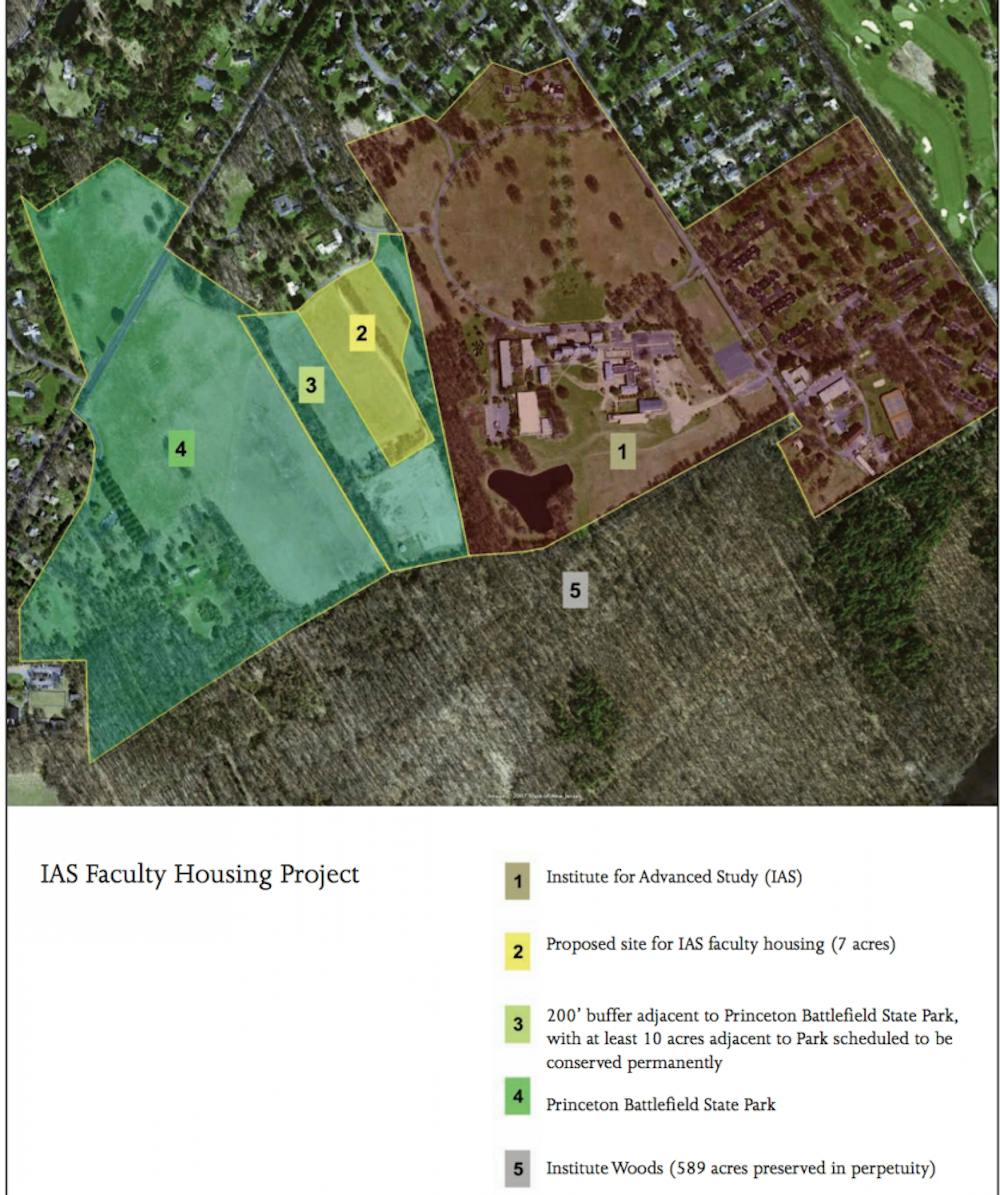Proposed IAS faculty housing project
The Princeton Battlefield Society intends to appeal the Institute for Advanced Study’s plans to build faculty housing on what they contend to be hallowed and historically significant ground.
The Institute for Advanced Study is not affiliated with the University but has long been a fixture of the town, once hosting scientists such as Albert Einstein, J. Robert Oppenheimer and Alan Turing GS "38.
The Princeton Battlefield State Park was established in 1946 on land rented from the Institute to commemorate the Battle of Princeton. The park was made a historical landmark in 1961, and in a 2008 report to Congress, the National Park Service named Princeton Battlefield on its list of the top 29 endangered battlefields from the Revolutionary War.
The Institute for Advanced Study contends it needs to maintain its own faculty housing due to rising real estate costs in town, while the Princeton Battlefield Society cited environmental reasons not to support the construction.
The Institute for Advanced Study’s construction plans were approved by a 5-2 vote by members of the Delaware and Raritan Canal Commission on Feb. 18. The proposed project site lies directly between the Institute and Princeton Battlefield State Park on land owned privately by the Institute.
In January, the DRCC did not approve the Institute’s project proposal when it came before the panel. The rejection stemmed from the fact that the land is adjacent to one of the streams the DRCC protects and its associated corridor buffer.
Contacted members of DRCC deferred comment to Bob Considine, press officer of the New Jersey Department of Environmental Protection.
A motion was made by commission member Mark Texel for the “reconsideration of the Institute’s Faculty Housing Project,” Considine said, adding that the motion was approved 6 to 1. “After that, there was a motion to approve faculty housing project with conditions. That motion was approved 5 to 2.”
The conditions include not disturbing the stream corridor buffer, building a temporary fence to keep work out of the canal area and having a DRCC engineer approve the drain plan, according to the Princeton Packet.

The process was fair, Considine said.
“The project fully complies with the Commission’s regulations, which is why the Commission voted as it did,” he said.
However, there was no basis for holding another vote without hearing opposing viewpoints, Jerry Hurwitz, president of the Princeton Battlefield Society, said.
“We didn’t get to re-present our case,” he said. “This, to me, was a distortion of the process, of the governing process. It should not stand, because were it to stand, there would be virtually no finality of any decision ... They decided to have a do-over just because one person, who is a state employee who might have been pressured to do this [made an] outrageous maneuver,” Hurwitz said.
Marlen Dooley, executive director of the DRCC, said the commission believes it has the authority to hear additional motions for reconsideration but declined to address allegations of misconduct or applying political casino online pressure.
The Battlefield Society would appeal the decision on grounds resembling due process violation claims, Hurwitz said.
“That’s just outrageous,” he said. “There’s no finality at all in any of that commission’s decisions, because somebody just needs to say at the next meeting, ‘I change my mind. I want a do-over. I want to revote’ — crazy.”
The Institute will now move to complete the other procedural steps necessary to officially begin the project, Christine Ferrara, senior public affairs officer at the Institute, said.
“We are very pleased that the Delaware and Raritan Canal Commission decided to reconsider its vote last month and voted 5-2 in favor of the Institute’s fully compliant Faculty Housing plans,” Ferrara said.
An appeal would not be the first time the Battlefield Society took the DRCC to court, Hurwitz added, referencing a 2012 appeal in which the group filed an appeal of a default determination by the DRCC due to a lack of a quorum. That appeal also related to a lack of opportunity for the Battlefield Society to express its objections to the Institute’s original application for faculty housing. The Battlefield Society ultimately won the appeal.
“It’s a very bad precedent,” he said. “[The DRCC doesn’t] have any rules that permit them to do what they did."
The conduct of the DRCC over the last few years has also contributed to public perceptions of New Jersey state corruption, he said.
“It’s not good for the reputation of New Jersey,” he said, adding that the incident lends credence to the theory that New Jersey is a corrupt state.
According to the most recent copy of the proposal, the Institute intends to build seven single-family dwellings and two four-unit townhouses to serve as faculty housing for the campus. The construction would include a 1,000-foot-long asphalt cul-de-sac, a sanitary pump station facility, five parking spaces, a low retaining wall, sidewalks and storm water management structures.








